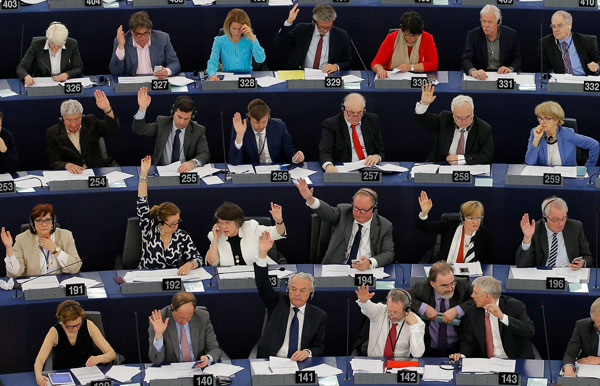Europe must not let itself be guided by fear
Updated: 2016-05-16 07:54
By Luigi Gambardella(China Daily)
|
||||||||
 |
|
Members of the European Parliament take part in a voting session in Strasbourg, France, April 12, 2016. [Photo/Agencies] |
Semantics are often the cause of misunderstandings, and this is true of the debate in the European Union over whether or not to grant China market economy status.
When China joined the World Trade Organization in 2001, it agreed to a 15-year transitional period during which other WTO members were allowed to apply the "nonmarket economy methodology" in anti-dumping procedures concerning China.
Under this methodology, the trade officials of the EU Commission are entitled to estimate by analogy the domestic production cost and prices of export products, instead of basing their investigation on domestic market prices.
The Chinese government argues that when the transitional period ends on December 11, 2016, the trade officials from the Commission will no longer be entitled to apply the nonmarket economy methodology.
Conversely, some lawyers argue that until the other WTO members grant market economy status to China in their national legislation, their anti-dumping investigators can continue to use the nonmarket economy methodology. That, in a nutshell, is what the whole China market economy status debate is about.
The interpretation of the WTO agreement could be tested in a dispute settlement procedure. But is this advisable? Let us not forget the political and symbolic dimensions of the debate. According to the Mission of China to the EU, more than 80 countries, including New Zealand, Australia, Peru, Chile and Association of Southeast Asian Nations countries, have already granted China market economy status. Their choice was primarily dictated by political reasons, including the conclusion of free trade agreements.
- EU should rethink resolution on China's market economy status
- EU lawmakers vote against recognizing China's market economy status
- Time for EU to grant China market economy status: expert
- Sooner better than later to recognize China's market economy status
- Market economy status not a bilateral negotiation
- EU launches public consultation for granting China market economy status
- Support China to gain market economy status
- No reason to deny China market economy status
- EU can benefit by accepting China as market economy
- Global health entering new era: WHO chief
- Brazil's planning minister steps aside after recordings revelation
- Vietnam, US adopt joint statement on advancing comprehensive partnership
- European border closures 'inhumane': UN refugee agency
- Japan's foreign minister calls A-bombings extremely regrettable
- Fukushima impact unprecedented for oceans: US expert

 Stars of Lijiang River: Elderly brothers with white beards
Stars of Lijiang River: Elderly brothers with white beards
 Wealthy Chinese children paying money to learn British manners
Wealthy Chinese children paying money to learn British manners
 Military-style wedding: Fighter jets, grooms in dashing uniforms
Military-style wedding: Fighter jets, grooms in dashing uniforms
 Striking photos around the world: May 16 - May 22
Striking photos around the world: May 16 - May 22
 Robots help elderly in nursing home in east China
Robots help elderly in nursing home in east China
 Hanging in the air: Chongqing holds rescue drill
Hanging in the air: Chongqing holds rescue drill
 2.1-ton tofu finishes in two hours in central China
2.1-ton tofu finishes in two hours in central China
 Six things you may not know about Grain Buds
Six things you may not know about Grain Buds
Most Viewed
Editor's Picks

|

|

|

|

|

|
Today's Top News
Liang avoids jail in shooting death
China's finance minister addresses ratings downgrade
Duke alumni visit Chinese Embassy
Marriott unlikely to top Anbang offer for Starwood: Observers
Chinese biopharma debuts on Nasdaq
What ends Jeb Bush's White House hopes
Investigation for Nicolas's campaign
Will US-ASEAN meeting be good for region?
US Weekly

|

|







